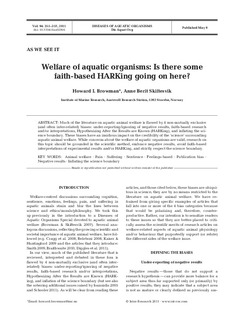| dc.contributor.author | Browman, Howard I. | |
| dc.contributor.author | Skiftesvik, Anne Berit | |
| dc.date.accessioned | 2011-10-31T09:08:29Z | |
| dc.date.issued | 2011-05-09 | |
| dc.identifier.uri | http://hdl.handle.net/11250/117239 | |
| dc.description.abstract | Much of the literature on aquatic animal welfare is flawed by 4 non-mutually exclusive
(and often inter-related) biases: under-reporting/ignoring of negative results, faith-based research
and/or interpretations, Hypothesizing After the Results are Known (HARKing), and inflating the science
boundary. These biases have an insidious impact on the credibility of the ‘science’ surrounding
aquatic animal welfare. While concerns about the welfare of aquatic organisms are valid, research on
this topic should be grounded in the scientific method, embrace negative results, avoid faith-based
interpretations of experimental results and/or HARKing, and strictly respect the science boundary. | no_NO |
| dc.language.iso | eng | no_NO |
| dc.publisher | Inter-Research | no_NO |
| dc.subject | fish welfare | no_NO |
| dc.subject | fiskevelferd | no_NO |
| dc.title | Welfare of aquatic organisms: Is there some faith-based HARKing going on here? | no_NO |
| dc.type | Journal article | no_NO |
| dc.type | Peer reviewed | no_NO |
| dc.subject.nsi | VDP::Agriculture and fishery disciplines: 900::Fisheries science: 920::Fish health: 923 | no_NO |
| dc.description.embargo | 2015-05-09 | |
| dc.source.pagenumber | 255-257 | no_NO |
| dc.source.volume | 94 | no_NO |
| dc.source.journal | Diseases of Aquatic Organisms | no_NO |
| dc.source.issue | 3 | no_NO |
| dc.identifier.doi | http://dx.doi.org/10.3354/dao02366 | |
